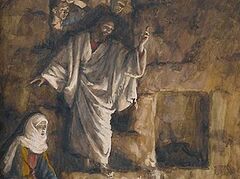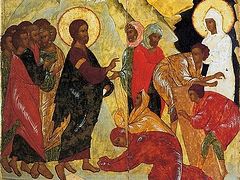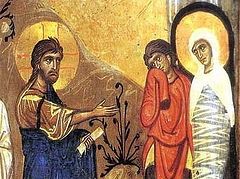 Raising Lazarus, Oil on Copper Plate, 1875, Carl Heinrich Bloch (Hope Gallery, Salt Lake City). Photo: wikipedia.org Before I say my word, brothers and sisters, I would like to say: Remember that those who commune of the Holy Mysteries should first try to come by the very beginning of the service, and second, confess, if possible, ahead of time, not at the last moment. I don’t say this to reprimand anyone—no! Because I know that it’s difficult for many; many live far away, and means of communication aren’t always adequate—this goes without saying. But as far as possible, always try to come to church and confess in advance and on time. It’s not good when people confess when the chalice has already been brought out. They should be standing then listening to the last prayer at the chalice before Communion, not before the analogion confessing their sins—this should be done earlier. I’m saying this so you keep it in mind.
Raising Lazarus, Oil on Copper Plate, 1875, Carl Heinrich Bloch (Hope Gallery, Salt Lake City). Photo: wikipedia.org Before I say my word, brothers and sisters, I would like to say: Remember that those who commune of the Holy Mysteries should first try to come by the very beginning of the service, and second, confess, if possible, ahead of time, not at the last moment. I don’t say this to reprimand anyone—no! Because I know that it’s difficult for many; many live far away, and means of communication aren’t always adequate—this goes without saying. But as far as possible, always try to come to church and confess in advance and on time. It’s not good when people confess when the chalice has already been brought out. They should be standing then listening to the last prayer at the chalice before Communion, not before the analogion confessing their sins—this should be done earlier. I’m saying this so you keep it in mind.
As we know from the Gospel, our Lord Jesus Christ told those around Him: Come unto Me, all ye that labour and are heavy laden, and I will give you rest (Mt. 11:28). And He further indicated that if a man takes up His yoke, His commandments, and His law, then ye shall find rest unto your souls (Mt. 11:29). This is why the Son of God was incarnate; this is why He came to Earth—to bring peace to worn-out mankind.
And this, in particular, is what people on Earth usually fear more than anything—death. Every philosophy retreats before death. All wisdom fades away when a coffin is before a man, and in it the decaying body of a dead man. No philosophy can help here! As said the hero of one of Turgenev’s novels: “Try to deny death. It will deny you, and that will be the end of it!”1 So that’s why the Lord came—I repeat, to calm human souls, knowing that what terrifies man most is death. And in this terrible matter, He gives us comfort and joy such that none but He, of course, can ever give. He said many times that He is the Resurrection and the Life, that for those who believe in Him, though they should die, they will live again. And we read in the Gospel how he prophetically said, foretelling the future, that there would be a moment when all that are in the graves shall hear His voice, And shall come forth (Jn. 5:28-29). Such a bright promise He has given us.
But His care for us didn’t stop there. He well knew that no matter how comforting such a promise is to man, the ever-present reality of death is terrifying. That’s why, before the very end of His earthy life, He works an amazing, great miracle—He goes to the grave of the deceased Lazarus. There were instances when He raised the dead before this: the son of the widow of Nain, the maiden Tabitha,2 the daughter of Jairus—but these were fresh victims who had just been taken by death, and He returned them to life. But here before us is the terrifying picture that not only had death already seized its victim, but had done its terrible deed, destroying the physical composition of the man, now rotting and decomposing.
Before this terrible picture of death appeared the Ruler of Life, saying: Take ye away the stone. He frightened those around Him. Martha made haste to say: Lord, by this time he stinketh: for he hath been dead four days (Jn. 11:39). Others were probably even more scared, thinking: “What’s this about? The smell of corruption will be unbearable. What’s He want?” But when they heard His word and rolled away the stone, as a man He offered up His prayer of thanksgiving to the Heavenly Father, and as God, turns to the rotting corpse, and we hear that voice that will thunder at some point in the future, when His Divine word that all the dead will come forth from their graves at the voice of the Son of God will be fulfilled. And in order to show people and assuage them completely, He shows what it will look like. And His awesome voice is heard: Lazarus, come forth! (Jn. 11:43). As it says in the prayers of the Church, this voice shook the whole infernal abyss, all the depths of Hades. Hell trembled, gave forth its victims, and he who just frightened everyone from the tomb comes out of it alive and well.
What an astounding and at the same time joyous miracle! That’s why this feast, Lazarus Saturday as we call it, is especially bright and joyous—one of the brightest days of the year! We see here in practice how our resurrection will occur, when the voice of the Son of God sounds forth—and by this voice the dead will leave their tombs, coming out alive. Only He could give people such hope and assure us this way! After that, the Church truly could calmly proclaim that when a man dies, it’s not the abyss of nothingness for him, it’s not annihilation, but if he’s a Christian then it’s only “rest eternal in blessed repose” for him. This is what the Lord has given us in this wonderful, striking miracle of His!
But don’t forget, beloved, that this feast is, as it were, a pre-celebration of tomorrow’s great feast. They have the same troparion: “By raising Lazarus from the dead before Thy Passion, Thou didst confirm the universal Resurrection, O Christ God!...” But this great feast tomorrow leads us to new liturgical sacred memories of the last days of the life of our Savior, of His last conversations and instructions, and, finally, of that great and holy deed that He accomplished in the Garden of Gethsemane, taking our sins upon Himself; on the Golgotha Cross, nailing these sins to the Cross and cleansing them with His Most Pure Blood; and, finally, coming out of His Sepulcher in glory, as the resurrected conqueror of hell and death! Don’t forget about this! The most wonderful, the most beautiful time in our Church liturgical year is beginning. Everyone should take care to go to church as much as possible on these sacred days, to spiritually nourish our souls and strengthen ourselves spiritually for the time to come.
Amen.



